Part 3: Episode 03: Signs of Anguish
This update covers:Gabriel Cunningham 2 - Signs of Anguish (The rest)
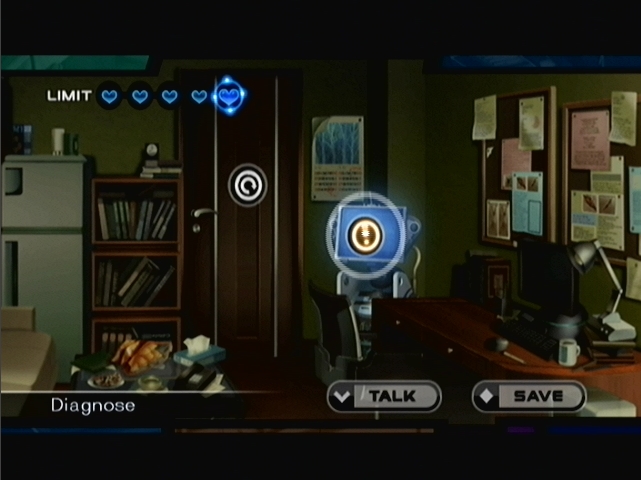
This is the last room we'll be seeing in Gabe's story: his office. Yes, the game reminds you how to leave for the third time in here.
In this room, you can talk to RONI to remind yourself of what you were doing. You can also save, which you should if you're low on life. The RONI terminal in the back is the most important function of this room, since it lets you sort through the most likely candidates based on the current evidence. Even if you're still looking, looking at the current candidates may give you an idea of where to search for more symptoms.
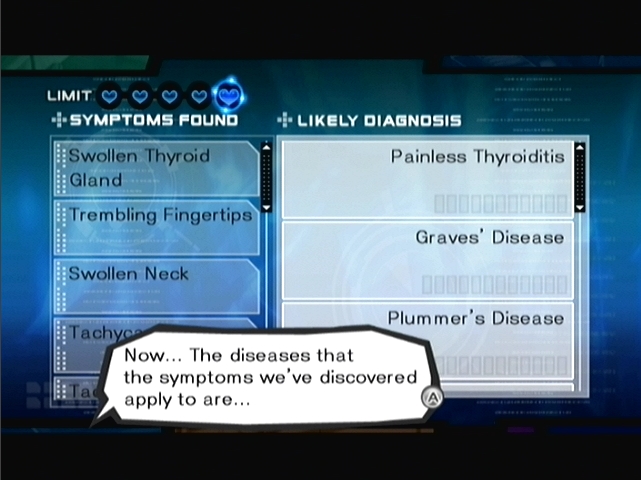
Essentially, you open up a disease description and drag the names of any symptoms that apply. If you have every symptom filled in a condition with none left over, you have your answer. Sometimes you can't get a complete diagnosis right away, and you'll just have to fill in what you can. In any other case, it's usually smart to start with the most recent entries, which will be towards the top, and skim the description to see if there are any symptoms in the description that aren't in your list, or vice versa. I won't bore you with a detailed analysis of every option, but I'll start with an easy example of what to rule out.
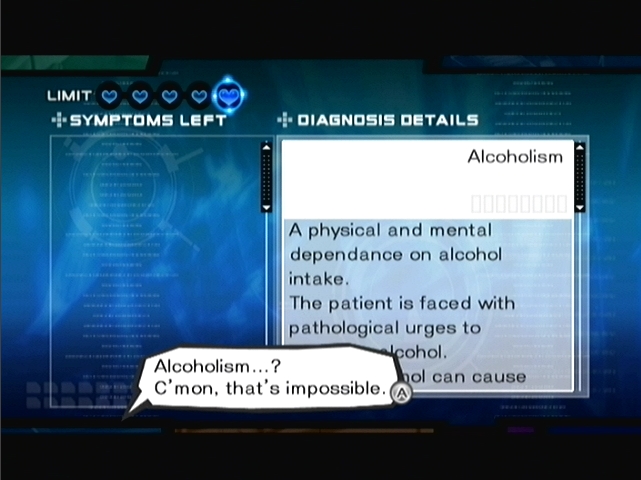
RONI: Doctor, if I may: There is no objective evidence to deny this condition. The symptoms are consistent with it, so it must be a viable diagnosis candidate.
Gabe: *sigh* You just don't get it, do you?
First, let's see our symptoms. Sorry that this has to be a wall of text, but that's what this part of the game entails: sifting through text.
SYMPTOM LIST
Swollen Thyroid Gland
Trembling Fingertips
Swollen Neck
Tachycardia
Tachypnea
Decrease in Weight
Dyspnea
Alcoholism:
A physical and mental dependence on alcohol intake. The patient is faced with pathological urges to consume alcohol. Lack of alcohol can cause conditions ranging from increased heart rate to headaches, sweating, psychological conditions such as hallucinations, and other nervous system conditions such as trembling of the fingers.
Looking at this description, it's true that some of these symptoms match the patient. She does have, for example, trembling fingers. On the other hand, she certainly hasn't mentioned hallucinations. More importantly, there's nothing in here that would explain the swollen neck. Basically, RONI is an idiot. Let's look at the first few candidates on the list instead.
Painless Thyroidosis
A condition in which the thyroid gland has been destroyed. The release of thyroid hormones into the bloodstream causes hyperthyroidism. In the onset of the disease, the thyroid gland swells, which can be confirmed through visual examination as a swelling on the neck. In some cases, the swollen thyroid gland places pressure on the respiratory tract, causing difficulty breathing. Increased hormonal levels in the blood cause increased heart rate and heavy breathing. Other symptoms that may arise include trembling fingers and weight loss. An analysis exam will reveal abnormalities such as low TSH level, high FT3 level, and high FT4 level. Almost no uptake of radioactive iodine can be confirmed in a scintigraphy.
We haven't done an analysis exam or scintigraphy yet, so not all of these can be confirmed. However, if you take a good look, everything on our list so far could be explained by this condition.
RONI: Doctor, it is possible that there may be more candidates which match the patient's symptoms.
Gabe: Did I say I was done yet?
Graves' Disease
A condition in which antibodies in the thyroid gland cause swelling of the thyroid gland and excessive thyroid hormone production. The entire thyroid gland swells. A visual exam will confirm swelling on the neck. In some cases, the swollen thyroid gland places pressure on the respiratory tract, causing difficulty breathing. The hormonal increase causes increased heart rate and increased breath rate, as well as trembling fingers and weight loss. An analysis exam will reveal abnormalities such as low TSH level, high FT3 level, and high FT4 level. An MRI exam will show swelling of the muscles around the eyes, and the entire thyroid gland will show an increase in radioactive iodine uptake.
Again, this hits everything we have so far. The bit about swollen eyes seems a bit off, but we haven't really done an MRI to confirm either way. This is definitely another candidate, and you need to put all the current symptoms into it in order to continue. There's still one more worth looking at after that.
Plummer's Disease
A condition in which benign tumours on the thyroid gland cause an excess of thyroid hormones to be excreted. Swelling of the thyroid gland and swelling on the neck can be determined through a visual exam. In some cases, the swollen thyroid gland places pressure on the respiratory tract, causing difficulty breathing. The hormonal increase causes increased heart rate and increased breath rate, as well as trembling fingers and weight loss. An analysis exam will reveal abnormalities such as low TSH level, high FT3 level, and high FT4 level. A scintigraphy will confirm the abnormal uptake of radioactive iodine in the tumor areas.
That one is similar to Graves' Disease, and covers all our symptoms. It's just as valid a candidate.
Gabe: That's three possible matches.
RONI: Yes, Doctor, but these are all thyroid gland diseases.
Gabe: Yeah. There's a good chance she has a thyroid problem. Let's move on to a definitive diagnosis. RONI, get approval for the necessary exams.
RONI: Yes, Doctor. Would you like me to submit "immediately" for the date and time?
Gabe: You catch on fast.
We now have an analysis exam available back in the exam room, and an MRI and Scintigraphy in the IA lab. We'll start with the analysis, since those symptoms were common for all three candidates.
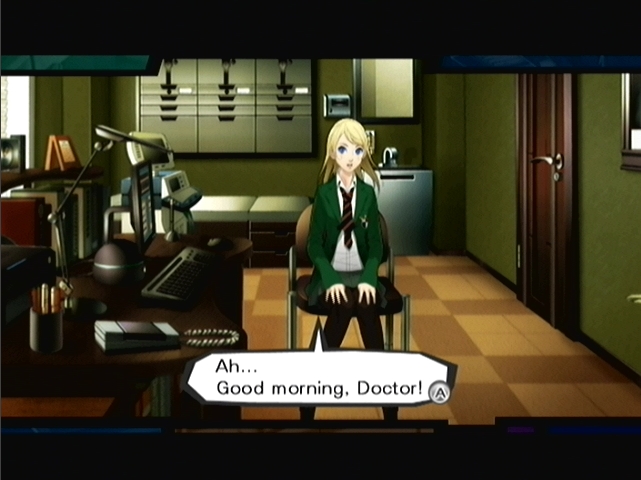
Nicole: Um, what did the test results say?
Gabe: Well, we're still narrowing it down, but it's most likely a thyroid gland disease.
Nicole: I'm going to be able to sing again, right!? If I ever lost my voice…
Gabe: Calm down. I know you're worried, but I'm not finished diagnosing you yet.
The analysis exam is a new option here. It's… well, let's take a look.
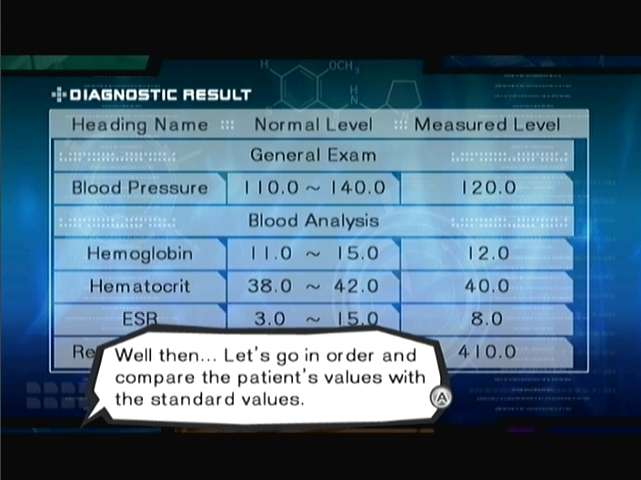
In short, the analysis exam is a massive list of numbers and acceptable ranges for those numbers. You just point out which numbers fall outside the ranges. I know that this is a real part of diagnosing patients, but it's a boring part of a video game about diagnosing patients.
This time, though, we know what we're looking for. All of them are at the bottom of the list, in the "immune serum" section.
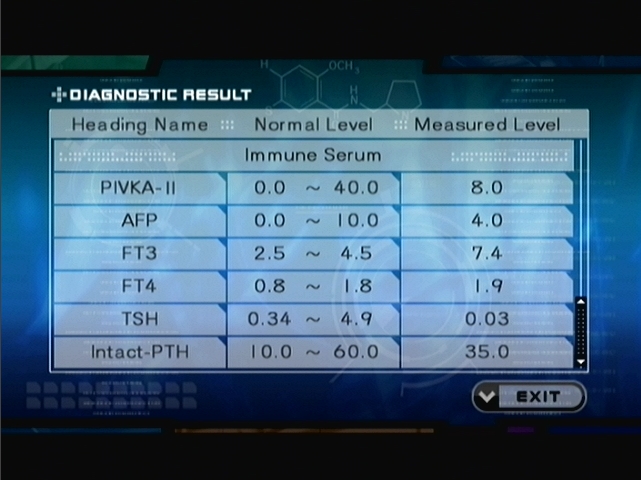
You can click on the name of the item to see a little description. When we find abnormal values, I'll show you that description, as doing them all right now would only result in an insuperable Mount Everest of text. You can plainly see the three values mentioned in the disease database are off.
FT3: Free Triidothyronine is a hormone secreted by the thyroid gland regulating growth, metabolism, and circulatory functions.
Gabe: This seems a little high. RONI, make a note of it.
FT4: Free Thyroxine is a hormone secreted by the thyroid gland regulating growth, metabolism, and circulatory functions.
Gabe: Well, it's not by much, but this is a bit higher than the standard average. RONI, record that for me.
TSH: Thyroid Stimulating Hormone is a hormone created by the pituitary gland. IT adjusts the secretion of thyroid hormones.
Gabe: Her TSH value seems rather low. RONI, record that.
We're actually done here as far as completing this diagnosis goes, but there's actually something hidden in this exam room. See, there are 8 special challenges for each doctor in Trauma Team. These range from completing all operations with an XS rank, to performing some daredevil challenge within a specific level. You can only access the list upon completing the game, and incomplete challenges are not stated directly, but need to be figured out based on a riddle or clue. For Gabe, all medals are earned by finding something unusual during the diagnosis that is not technically a symptom. I'm about to show you the first.
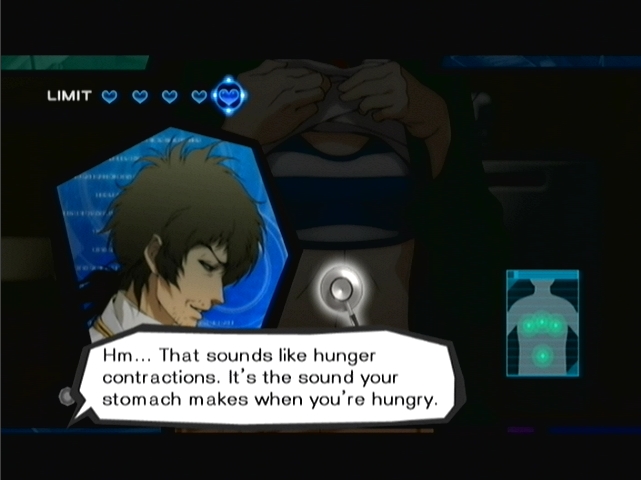
To get Gabe's first medal, you need to auscultate Nicole again AFTER narrowing down the list of candidates, then listen to her upper abdomen to hear hunger noises. There is effectively a fifth section to listen to for just this one medal, when you have no reason to look here anyway. I actually found this medal last.
I'm considering leaving future medal challenges up to the thread, to see if you guys can find them.
RONI: Doctor, allow me to provide information about the exams that are now available.

RONI: By confirming the uptake of isotopes, the condition of tumors and organs can be analyzed. Next, the Magnetic Resonance Imaging exam, or "MRI" for short. It uses magnetism to take cross-section images of the human body. It is similar to a CT scan, but there is no exposure to radiation. Because MRI exams yield more detailed images, they are usually used for foci in the head.
Gabe: You're just a walking encyclopedia of things I already know, huh?
MRI_01
Patient:

Sample:
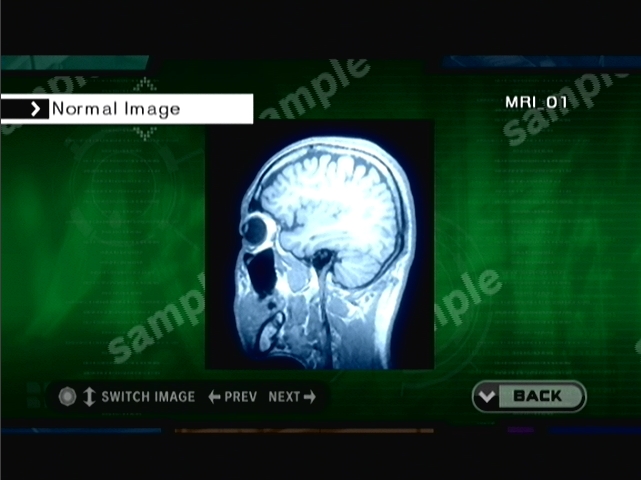
Scintigraphy_01
Patient:
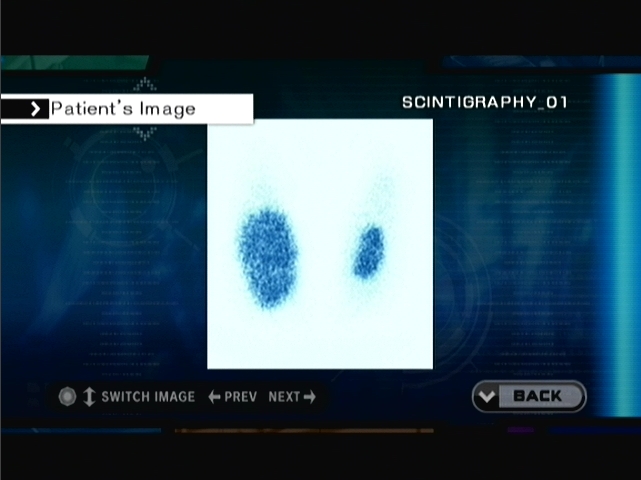
Sample:

If you haven't been paying attention, then I bet you looked at that MRI for awhile.
Actually, if you haven't been paying attention, then you probably didn't bother trying to find it yourself…
Well, whatever, then. The MRI was for looking for swelling in the muscles around the eyes to confirm Graves' Disease. Since there is none, we need to look at the scintigraphy. The fact that something is off should be immediately obvious.
Gabe: The uptake of radioactive iodine is concentrated in several areas of the thyroid gland. RONI, make a note of it.
Now, we can go back to the office and put it all together.
DIAGNOSIS
SYMPTOM LIST
Abnormal Thyroid Uptake
Low TSH Level
High FT3 Level
High FT4 Level
Swollen Thyroid Gland
Trembling Fingertips
Swollen Neck
Tachycardia
Tachypnea
Decrease in Weight
Dyspnea
Candidates:
Painless Thyroidosis
A condition in which the thyroid gland has been destroyed. The release of thyroid hormones into the bloodstream causes hyperthyroidism. In the onset of the disease, the thyroid gland swells, which can be confirmed through visual examination as a swelling on the neck. In some cases, the swollen thyroid gland places pressure on the respiratory tract, causing difficulty breathing. Increased hormonal levels in the blood cause increased heart rate and heavy breathing. Other symptoms that may arise include trembling fingers and weight loss. An analysis exam will reveal abnormalities such as low TSH level, high FT3 level, and high FT4 level. Almost no uptake of radioactive iodine can be confirmed in a scintigraphy.
Graves' Disease
A condition in which antibodies in the thyroid gland cause swelling of the thyroid gland and excessive thyroid hormone production. The entire thyroid gland swells. A visual exam will confirm swelling on the neck. In some cases, the swollen thyroid gland places pressure on the respiratory tract, causing difficulty breathing. The hormonal increase causes increased heart rate and increased breath rate, as well as trembling fingers and weight loss. An analysis exam will reveal abnormalities such as low TSH level, high FT3 level, and high FT4 level. An MRI exam will show swelling of the muscles around the eyes, and the entire thyroid gland will show an increase in radioactive iodine uptake.
Plummer's Disease
A condition in which benign tumours on the thyroid gland cause an excess of thyroid hormones to be excreted. Swelling of the thyroid gland and swelling on the neck can be determined through a visual exam. In some cases, the swollen thyroid gland places pressure on the respiratory tract, causing difficulty breathing. The hormonal increase causes increased heart rate and increased breath rate, as well as trembling fingers and weight loss. An analysis exam will reveal abnormalities such as low TSH level, high FT3 level, and high FT4 level. A scintigraphy will confirm the abnormal uptake of radioactive iodine in the tumor areas.
These three conditions are almost the same. The difference could only be distinguished with the MRI and Scintigraphy exams. We didn't see any swelling in the eyes, or increased uptake, which rules out Graves' Disease. The fact that we saw a significant amount of uptake at all rules out Painless Thyroidosis. This leaves us with only one last option.
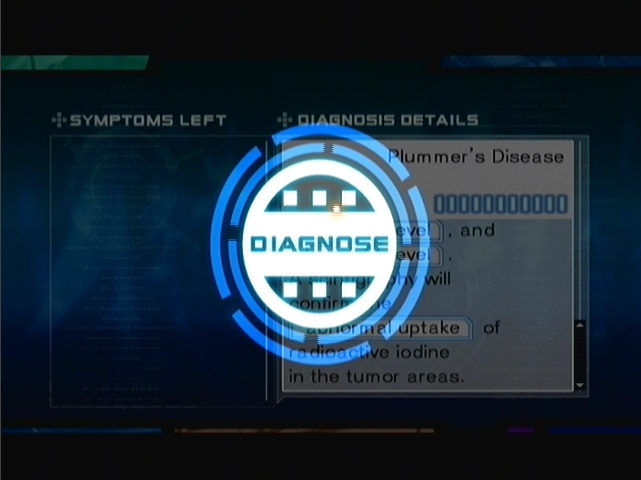
Signs of Anguish: Diagnosis (Definitely watch this)


Next time: We'll get to perform Nicole's operation.